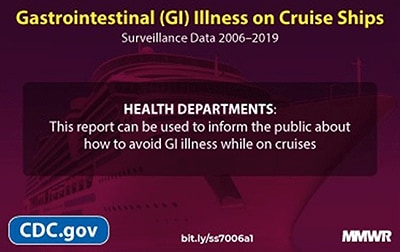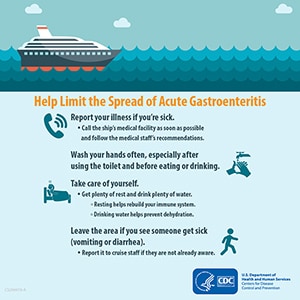Acute Gastroenteritis (AGE) on Cruise Ships, 2006-2019
Maritime Illness Database and Reporting System
Gastrointestinal illness can spread quickly in closed and semienclosed environments, such as cruise ships, but rates of AGE illness on passenger cruise ships have significantly decreased over time.

From 2006 through 2019, approximately 127 million passengers sailed on 252 cruise ships in the Vessel Sanitation Program’s (VSP) jurisdiction. The rate of AGE illness on cruise ships decreased during 2006-2019 for passengers and crew.
- Illness rates among passengers increased on larger ships and on voyages longer than 7 days.
- Illness rates among crew were higher on larger ships and on voyages lasting >5 days.
Ship size and voyage length are associated with AGE illness, and more targeted effort is needed to prevent unequal illness rates among passengers and crew.
VSP defines AGE illness as
- Three or more loose stools within a 24-hour period or what is more than normal for the individual, OR
- Vomiting along with one of the following symptoms:
- diarrhea, or
- bloody stool, or
- muscle ache, or
- headache, or
- abdominal cramps, or
- fever.
Decreasing numbers of AGE outbreaks on cruise ships are likely a result of several factors:
- The evolution of environmental health sanitation standards established in 1975 by VSP and enforced during VSP ship inspections.
- Cruise industry practices such as
- implementation of hygiene standards,
- availability of handwashing stations in public areas on ships, and
- health screening of passengers and crew before embarkation.
You can help limit the spread of AGE by
- Reporting your illness if you’re sick.
- Call the ship’s medical facility as soon as possible and follow the medical staff’s recommendations. Reporting your illness
- allows ship management to know if they need to increase cleaning,
- allows ship staff to isolate ill passengers to prevent transmission, and
- lets VSP know if an outbreak is occurring on the ship.
- Washing your hands often, especially after using the toilet and before eating or drinking.
- Taking care of yourself.
- Get plenty of rest and drink plenty of water.
- Resting helps rebuild your immune system.
- Drinking water helps prevent dehydration.
- Leaving the area if you see someone get sick (vomiting or diarrhea) and reporting it to cruise staff if they are not already aware.
- Get plenty of rest and drink plenty of water.
- Call the ship’s medical facility as soon as possible and follow the medical staff’s recommendations. Reporting your illness
Related Links
Jenkins KA, Vaughan GH Jr, Rodriguez LO, Freeland A. Acute gastroenteritis on cruise ships — Maritime Illness Database and Reporting System, United States, 2006–2019. MMWR Surv. Summ. 2021;70(6):1–9.
Freeland AL, Vaughan GH Jr, Banerjee SN. Acute gastroenteritis on cruise ships—United States, 2008–2014. MMWR. 2016;65(1):1–5.
Cramer EH, Blanton C, Browne L, Vaughan G, Bopp C, Forney D. Epidemiology of gastroenteritis on cruise ships, 2001-2004: the impact of noroviruses.external icon Am J Prev Med. 2006;30(3):252–7.
Cramer EH, Gu DX, Durbin RE, Vessel Sanitation Program Environmental Health Inspection Team. Diarrheal disease on cruise ships, 1990–2000: the impact of environmental health programs.external icon Am J Prev Med. 2003;24(3):227–33.
